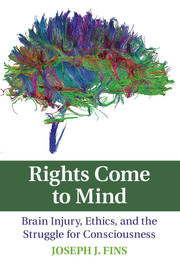Book contents
- Frontmatter
- Dedication
- Epigraph
- Contents
- Miscellaneous Frontmatter
- Acknowledgments
- Introduction
- 1 Decisions
- 2 The Injury
- 3 Coming to Terms with Brain Injury
- 4 The Origins of the Vegetative State
- 5 A Shift since Quinlan
- 6 Maggie's Wishes
- 7 Something Happened in Arkansas
- 8 From PVS to MCS
- 9 Leaving the Hospital
- 10 Heather's Story
- 11 Neuroimaging and Neuroscience in the Public Mind
- 12 Contractures and Contradictions: Medical Necessity and the Injured Brain
- 13 Minds, Monuments, and Moments
- 14 Heads and Hearts, Toil and Tears
- 15 What Do Families Want?
- 16 Deep Brain Stimulation in MCS
- 17 Mending Our Brains, Minding Our Ethics
- 18 It's Still Freedom
- 19 Maggie Is in Town
- 20 When Consciousness Becomes Prosthetic
- 21 The Rights of Mind
- 22 A Call for Advocacy
- Epilogue
- Notes
- In Memoriam
- Index
18 - It's Still Freedom
Published online by Cambridge University Press: 05 September 2015
- Frontmatter
- Dedication
- Epigraph
- Contents
- Miscellaneous Frontmatter
- Acknowledgments
- Introduction
- 1 Decisions
- 2 The Injury
- 3 Coming to Terms with Brain Injury
- 4 The Origins of the Vegetative State
- 5 A Shift since Quinlan
- 6 Maggie's Wishes
- 7 Something Happened in Arkansas
- 8 From PVS to MCS
- 9 Leaving the Hospital
- 10 Heather's Story
- 11 Neuroimaging and Neuroscience in the Public Mind
- 12 Contractures and Contradictions: Medical Necessity and the Injured Brain
- 13 Minds, Monuments, and Moments
- 14 Heads and Hearts, Toil and Tears
- 15 What Do Families Want?
- 16 Deep Brain Stimulation in MCS
- 17 Mending Our Brains, Minding Our Ethics
- 18 It's Still Freedom
- 19 Maggie Is in Town
- 20 When Consciousness Becomes Prosthetic
- 21 The Rights of Mind
- 22 A Call for Advocacy
- Epilogue
- Notes
- In Memoriam
- Index
Summary
We Should Be So Lucky
“Indulge me,” I remember asking the research team. It was winter 2003 and we were at a round table in the corner of Weill Cornell's Griffis Faculty Club. Niko, Joe Giacino, the surgeon, and I were finalizing the research protocol that would eventually be approved by the institutional review boards at JFK-Johnson, the Cleveland Clinic, and Weill Cornell.– It would also inform the basis for an application for investigational device exemption (IDE) from the Food and Drug Administration. IDEs are required when a new device is tested or when an established device is proposed for a novel purpose. Our plan was to use a DBS device routinely used to treat Parkinson's disease in our study to address the impairments seen in the minimally conscious state.–
By this time, the details of the protocol were being finalized. We decided to restrict the study to individuals who were MCS secondary to TBI. We agreed that going into patients with a higher level of function put them at risk of incremental harm when exposed to an intervention that was experimental and of unclear benefit. We specified traumatic brain injury over other etiologies because of their more favorable prognosis, as compared to anoxic injury. Inclusion was limited to patients from eighteen to fifty-five years, so as not to have data complicated by either the developmental processes of a younger brain or the degenerative ones of an older one. All subjects had to be past the one-year postinjury mark for study inclusion so as to not confuse the natural process of recovery, which can occur up to a year in TBI, with the facilitated recovery we were trying to prompt using DBS.
I next turned to the remaining ethical issues and explained that we had made a good argument for the use of a surrogate decision maker, the legally authorized representative, to consent to the surgery. But, I asked, what happens if a subject got better and could give his or her own consent?
- Type
- Chapter
- Information
- Rights Come to MindBrain Injury, Ethics, and the Struggle for Consciousness, pp. 227 - 247Publisher: Cambridge University PressPrint publication year: 2015



